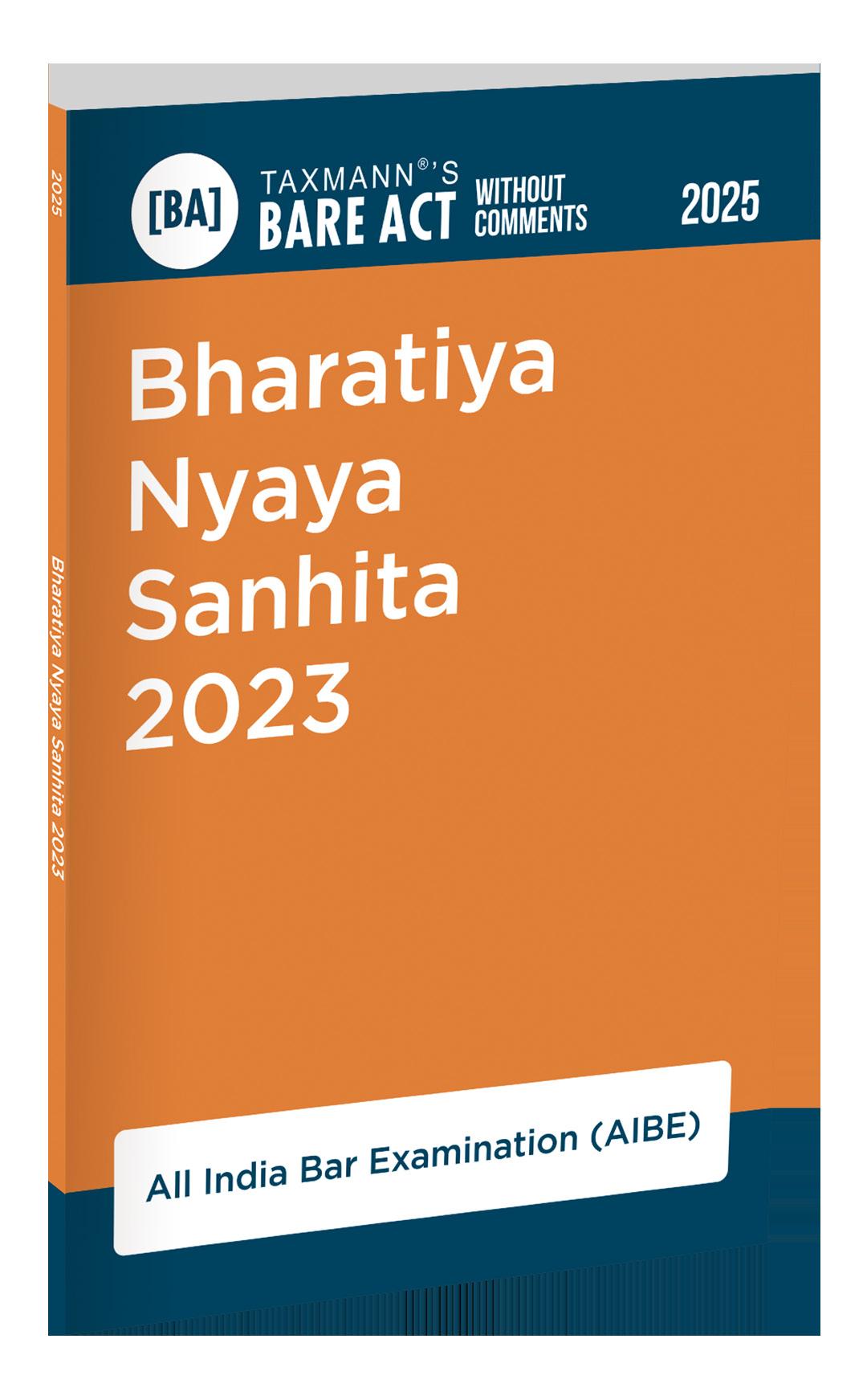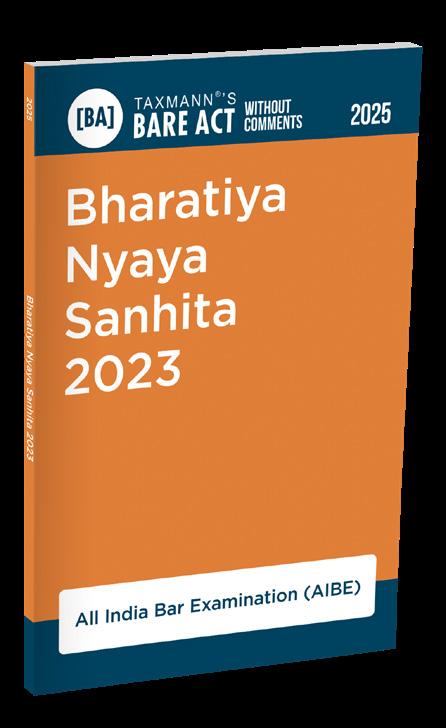BHARATIYA NYAYA SANHITA, 2023
8.
CHAPTER IV
CHAPTER VI
OF OFFENCES AFFECTING THE HUMAN BODY
CHAPTER VII
OFFENCES AGAINST THE STATE
147. Waging, or attempting to wage war, or abetting waging of war, against Government of India
148. Conspiracy to commit offences punishable by section 147
149. Collecting arms, etc., with intention of waging war against Government of India
150. Concealing with intent to facilitate design to wage war
151. Assaulting President, Governor, etc., with intent to compel or restrain exercise of any lawful
153. Waging war against Government of any foreign State at peace with Government of India
154. Committing depredation on territories of foreign State at peace with Government of India
155. Receiving property taken by war or depredation mentioned in sections 153 and 154
158. Aiding escape of, rescuing or harbouring such prisoner
CHAPTER VIII OF OFFENCES
159. Abetting mutiny, or attempting to seduce a soldier, sailor or airman from his duty
160. Abetment of mutiny, if mutiny is committed in consequence thereof
161. Abetment of assault by soldier, sailor or airman on his superior officer, when in execution of his office
162. Abetment of such assault, if assault committed
163.
165. Deserter concealed on board merchant vessel through negligence of master
166. Abetment of act of insubordination by soldier, sailor or airman
167. Persons subject to certain Acts
168. Wearing garb or carrying token used by soldier, sailor or airman
CHAPTER IX
OFFENCES RELATING TO ELECTIONS
CHAPTER X OF OFFENCES RELATING TO COIN, CURRENCY-NOTES, BANK-NOTES, AND GOVERNMENT STAMPS
178. Counterfeiting coin, Government stamps, currency-notes or bank-notes 82
179. Using as genuine, forged or counterfeit coin, Government stamp, currency-notes or bank-notes 83
180. Possession of forged or counterfeit coin, Government stamp, currency-notes or bank-notes 83
181. Making or possessing instruments or materials for forging or counterfeiting coin, Government stamp, currency-notes or bank-notes 83
182. Making or using documents resembling currency-notes or bank-notes 84
183. Effacing writing from substance bearing Government stamp, or removing from document a stamp used for it, with intent to cause loss to Government 84
184. Using Government stamp known to have been before used 84
185. Erasure of mark denoting that stamp has been used 85
186. Prohibition of fictitious stamps 85
187. Person employed in mint causing coin to be of different weight or composition from that fixed by law 85
188. Unlawfully taking coining instrument from mint 86
CHAPTER XI
OF OFFENCES AGAINST THE PUBLIC TRANQUILITY
192. Want only giving provocation with intent to cause riot-if rioting be committed; if not committed
193. Liability of owner, occupier, etc., of land on which an unlawful assembly or riot takes place
195. Assaulting or obstructing public servant when suppressing riot, etc. 90
196. Promoting enmity between different groups on grounds of religion, race, place of birth, residence, language, etc., and doing acts prejudicial to maintenance of harmony
CHAPTER XII
CHAPTER
222.
CHAPTER XIV
OF FALSE EVIDENCE AND OFFENCES
243. Fraudulent removal or concealment of property to prevent its seizure as forfeited or in execution
244. Fraudulent claim to property to prevent its seizure as forfeited or in execution
245. Fraudulently suffering decree for sum not due
246. Dishonestly making false claim in Court
247. Fraudulently obtaining decree for sum not due
248. False charge of offence made with intent to injure
249. Harbouring offender
250. Taking gift, etc., to screen an offender from punishment
251. Offering gift or restoration of property in consideration of screening offender
252. Taking gift to help to recover stolen property, etc.
253. Harbouring offender who has escaped from custody or whose apprehension has been ordered
254. Penalty for harbouring robbers or dacoits 114
255. Public servant disobeying direction of law with intent to save person from punishment or property from forfeiture 114
256. Public servant framing incorrect record or writing with intent to save person from punishment or property from forfeiture 114
257. Public servant in judicial proceeding corruptly making report, etc., contrary to law 115
258. Commitment for trial or confinement by person having authority who knows that he is acting contrary to law 115
259. Intentional omission to apprehend on part of public servant bound to apprehend 115
260. Intentional omission to apprehend on part of public servant bound to apprehend person under sentence or lawfully committed
261. Escape from confinement or custody negligently suffered by public servant
262. Resistance or obstruction by a person to his lawful apprehension
263. Resistance or obstruction to lawful apprehension of another person 117
264. Omission to apprehend, or sufferance of escape, on part of public servant, in cases not otherwise provided for 118
265. Resistance or obstruction to lawful apprehension or escape or rescue in cases not otherwise provided for
266. Violation of condition of remission of punishment
267. Intentional insult or interruption to public servant sitting in judicial proceeding
268. Personation of assessor
269. Failure by person released on bail bond or bond to appear in Court
CHAPTER XV
OF OFFENCES AFFECTING THE PUBLIC HEALTH, SAFETY, CONVENIENCE, DECENCY AND MORALS
270.
290. Negligent conduct with respect to pulling down, repairing or constructing buildings, etc.
291. Negligent conduct with respect to animal
292. Punishment for public nuisance in cases not otherwise provided for
293. Continuance of nuisance after injunction to discontinue
294. Sale, etc., of obscene books, etc.
295. Sale, etc., of obscene objects to child
296. Obscene acts and songs
297. Keeping lottery office
CHAPTER XVI
OF OFFENCES RELATING TO RELIGION
298. Injuring or defiling place of worship with intent to insult religion of any class
299. Deliberate and malicious acts, intended to outrage religious feelings of any class by insulting its religion or religious beliefs
300. Disturbing religious assembly
301. Trespassing on burial places, etc.
302. Uttering words, etc., with deliberate intent to wound religious feelings of any person
CHAPTER XVII
306. Theft by clerk or servant of property in possession of master
307. Theft after preparation made for causing death, hurt or restraint in order to committing of theft
Extortion
326. Mischief by injury, inundation, fire or explosive substance, etc.
327. Mischief with intent to destroy or make unsafe a rail, aircraft, decked vessel or one of twenty tons burden
328. Punishment for intentionally running vessel aground or ashore with intent to commit theft, etc.
330. House-trespass and house-breaking
331. Punishment for house-trespass or house-breaking
333. House-trespass after preparation for hurt, assault or wrongful restraint
334. Dishonestly breaking open receptacle containing property
CHAPTER XVIII
Forgery of record of Court or of public register, etc.
338. Forgery of valuable security, will, etc.
339. Having possession of document described in section 337 or section 338, knowing it to be forged and intending to use it as genuine
340. Forged document or electronic record and using it as genuine
341. Making or possessing counterfeit seal, etc., with intent to commit forgery punishable under section 338
342. Counterfeiting device or mark used for authenticating documents described in section 338, or possessing counterfeit marked material
343. Fraudulent cancellation, destruction, etc., of will, authority to adopt, or valuable security
Bharatiya Nyaya Sanhita, 2023
[45 OF 2023]
An Act to consolidate and amend the provisions relating to offences and for matters connected therewith or incidental thereto.
BE it enacted by Parliament in the Seventy-fourth Year of the Republic of India as follows:––
CHAPTER I PRELIMINARY
Short title, commencement and application.
1. (1) This Act may be called the Bharatiya Nyaya Sanhita, 2023.
Corresponding Provision : Section 1 of IPC, 1860
(2)It shall come into force on such date as the Central Government may, by notification in the Official Gazette†, appoint, and different dates may be appointed for different provisions of this Sanhita.
Corresponding Provision : Section 1 of IPC, 1860
(3)Every person shall be liable to punishment under this Sanhita and not otherwise for every act or omission contrary to the provisions thereof, of which he shall be guilty within India.
Corresponding Provision : Section 2 of IPC, 1860
(4)Any person liable, by any law for the time being in force in India, to be tried for an offence committed beyond India shall be dealt with according to the provisions of this Sanhita for any act committed beyond India in the same manner as if such act had been committed within India.
Corresponding Provision : Section 3 of IPC, 1860
(5)The provisions of this Sanhita shall also apply to any offence committed by—
(a) any citizen of India in any place without and beyond India; (b)any person on any ship or aircraft registered in India wherever it may be;
† Notification No. S.O. 850(E), dated 23-2-2024 - In exercise of the powers conferred by sub-section (2) of section 1 of the Bharatiya Nyaya Sanhita, 2023 (45 of 2023), the Central Government hereby appoints the 1st day of July, 2024 as the date on which the provisions of the said Sanhita, except the provision of sub-section (2) of section 106, shall come into force.
(c) any person in any place without and beyond India committing offence targeting a computer resource located in India.
Explanation.—In this section, the word “offence” includes every act committed outside India which, if committed in India, would be punishable under this Sanhita.
Illustration
A, who is a citizen of India, commits a murder in any place without and beyond India. He can be tried and convicted of murder in any place in India in which he may be found.
Corresponding Provision : Section 4 of IPC, 1860
(6) Nothing in this Sanhita shall affect the provisions of any Act for punishing mutiny and desertion of officers, soldiers, sailors or airmen in the service of the Government of India or the provisions of any special or local law.
Corresponding Provision : Section 5 of IPC, 1860
Definitions.
2. In this Sanhita, unless the context otherwise requires,––
(1) “act” denotes as well a series of acts as a single act;
Corresponding Provision : Sections 32 and 33 of IPC, 1860
(2) “animal” means any living creature, other than a human being;
Corresponding Provision : Section 47 of IPC, 1860
(3) “child” means any person below the age of eighteen years;
(4) “counterfeit”.––A person is said to “counterfeit” who causes one thing to resemble another thing, intending by means of that resemblance to practise deception, or knowing it to be likely that deception will thereby be practised.
Explanation 1.—It is not essential to counterfeiting that the imitation should be exact.
Explanation 2.—When a person causes one thing to resemble another thing, and the resemblance is such that a person might be deceived thereby, it shall be presumed, until the contrary is proved, that the person so causing the one thing to resemble the other thing intended by means of that resemblance to practise deception or knew it to be likely that deception would thereby be practised;
Corresponding Provision : Section 28 of IPC, 1860
(5) “Court” means a Judge who is empowered by law to act judicially alone, or a body of Judges which is empowered by law to act judicially as a body, when such Judge or body of Judges is acting judicially;
Corresponding Provision : Section 20 of IPC, 1860
(6) “death” means the death of a human being unless the contrary appears from the context;
Corresponding Provision : Section 46 of IPC, 1860
(7) “dishonestly” means doing anything with the intention of causing wrongful gain to one person or wrongful loss to another person;
Corresponding Provision : Section 24 of IPC, 1860
(8) “document” means any matter expressed or described upon any substance by means of letters, figures or marks, or by more than one of those means, and includes electronic and digital record, intended to be used, or which may be used, as evidence of that matter.
Explanation 1.—It is immaterial by what means or upon what substance the letters, figures or marks are formed, or whether the evidence is intended for, or may be used in a Court or not.
Illustrations
(a) A writing expressing the terms of a contract, which may be used as evidence of the contract, is a document.
(
b) A cheque upon a banker is a document.
(
c) A power-of-attorney is a document.
(d) A map or plan which is intended to be used or which may be used as evidence, is a document.
(
e) A writing containing directions or instructions is a document.
Explanation 2. Whatever is expressed by means of letters, figures or marks as explained by mercantile or other usage, shall be deemed to be expressed by such letters, figures or marks within the meaning of this section, although the same may not be actually expressed.
Illustration
A writes his name on the back of a bill of exchange payable to his order. The meaning of the endorsement, as explained by mercantile usage, is that the bill is to be paid to the holder. The endorsement is a document, and shall be construed in the same manner as if the words “pay to the holder” or words to that effect had been written over the signature;
Corresponding Provision : Section 29 of IPC, 1860 (9) “fraudulently” means doing anything with the intention to defraud but not otherwise;
Corresponding Provision : Section 25 of IPC, 1860 (10) “gender”.—The pronoun “he” and its derivatives are used of any person, whether male, female or transgender.
Explanation.–– “transgender” shall have the meaning assigned to it in clause (k) of section 2 of the Transgender Persons (Protection of Rights) Act, 2019 (40 of 2019);
Corresponding Provision : Section 8 of IPC, 1860 (11) “good faith”.—Nothing is said to be done or believed in “good faith” which is done or believed without due care and attention;
Corresponding Provision : Section 52 of IPC, 1860
(12) “Government” means the Central Government or a State Government;
Corresponding Provision : Section 17 of IPC, 1860
(13) “harbour” includes supplying a person with shelter, food, drink, money, clothes, arms, ammunition or means of conveyance, or the assisting a person by any means, whether of the same kind as those enumerated in this clause or not, to evade apprehension;
Corresponding Provision : Section 52A of IPC, 1860
(14) “injury” means any harm whatever illegally caused to any person, in body, mind, reputation or property;
Corresponding Provision : Section 44 of IPC, 1860
(15) “illegal” and “legally bound to do”.—The word “illegal” is applicable to everything which is an offence or which is prohibited by law, or which furnishes ground for a civil action; and a person is said to be “legally bound to do” whatever it is illegal in him to omit;
Corresponding Provision : Section 43 of IPC, 1860
(16) “Judge” means a person who is officially designated as a Judge and includes a person,––
(i) who is empowered by law to give, in any legal proceeding, civil or criminal, a definitive judgment, or a judgment which, if not appealed against, would be definitive, or a judgment which, if confirmed by some other authority, would be definitive; or
(ii) who is one of a body or persons, which body of persons is empowered by law to give such a judgment.
Illustration
A Magistrate exercising jurisdiction in respect of a charge on which he has power to sentence to fine or imprisonment, with or without appeal, is a Judge;
Corresponding Provision : Section 19 of IPC, 1860
(17) “life” means the life of a human being, unless the contrary appears from the context;
Corresponding Provision : Section 45 of IPC, 1860
(18) “local law” means a law applicable only to a particular part of India;
Corresponding Provision : Section 42 of IPC, 1860
(19) “man” means male human being of any age;
Corresponding Provision : Section 10 of IPC, 1860
(20) “month” and “year”.––Wherever the word “month” or the word “year” is used, it is to be understood that the month or the year is to be reckoned according to the Gregorian calendar;
Corresponding Provision : Section 49 of IPC, 1860
(21) “movable property” includes property of every description, except land and things attached to the earth or permanently fastened to anything which is attached to the earth;
Corresponding Provision : Section 22 of IPC, 1860
(22) “number”.—Unless the contrary appears from the context, words importing the singular number include the plural number, and words importing the plural number include the singular number;
Corresponding Provision : Section 9 of IPC, 1860
(23) “oath” includes a solemn affirmation substituted by law for an oath, and any declaration required or authorised by law to be made before a public servant or to be used for the purpose of proof, whether in a Court or not;
Corresponding Provision : Section 51 of IPC, 1860
(24) “offence”.—Except in the Chapters and sections mentioned in subclauses (a) and (b), the word “offence” means a thing made punishable by this Sanhita, but––
(a) in Chapter III and in the following sections, namely, sub-sections (2), (3), (4) and (5) of section 8, sections 9, 49, 50, 52, 54, 55, 56, 57, 58, 59, 60, 61, 119, 120, 123, sub-sections (7) and (8) of sections 127, 222, 230, 231, 240, 248, 250, 251, 259, 260, 261, 262, 263, sub-sections (6) and (7) of section 308 and sub-section (2) of section 330, the word “offence” means a thing punishable under this Sanhita, or under any special law or local law; and
(b) in sub-section (1) of section 189, sections 211, 212, 238, 239, 249, 253 and sub-section (1) of section 329, the word “offence” shall have the same meaning when the act punishable under the special law or local law is punishable under such law with imprisonment for a term of six months or more, whether with or without fine;
Corresponding Provision : Section 40 of IPC, 1860
(25) “omission” denotes as well as a series of omissions as a single omission;
Corresponding Provision : Section 33 of IPC, 1860
(26) “person” includes any company or association or body of persons, whether incorporated or not;
Corresponding Provision : Section 11 of IPC, 1860
(27) “public” includes any class of the public or any community;
Corresponding Provision : Section 12 of IPC, 1860
(28) “public servant” means a person falling under any of the descriptions, namely:—
BHARATIYA NYAYA SANHITA 2023 – BARE ACT
WITHOUT COMMENTS | AIBE
AUTHOR : TAXMANN’S EDITORIAL BOARD
PUBLISHER : TAXMANN
DATE OF PUBLICATION : AUGUST 2025
EDITION : 2025 EDITION
ISBN NO : 9789371268912
NO. OF PAGES : 192
BINDING TYPE : PAPERBACK
DESCRIPTION
Bharatiya Nyaya Sanhita 2023 [Bare Act without Comments] by Taxmann for All India Bar Examination (AIBE) presents the complete and authentic statutory text, free from case law or commentary, making it a precise legal reference. Designed for AIBE aspirants, law students, and practitioners, it provides direct access to the unaltered provisions of the law.
The Present Publication is the 2025 Edition, covering the amended and updated text of the Bharatiya Nyaya Sanhita [Act No. 45 of 2023], with the following noteworthy features:
• [Authentic Text] Exact reproduction of the Act as enacted by Parliament
• [No Commentary] Free from case law, editorial notes, or explanations
• [Updated Edition] Incorporates all amendments up to 2025 with enforcement notification
• [Exam-oriented] Tailored for AIBE and competitive exams, permitting only bare text
• [User-friendly Format] Section-wise presentation for easy navigation










